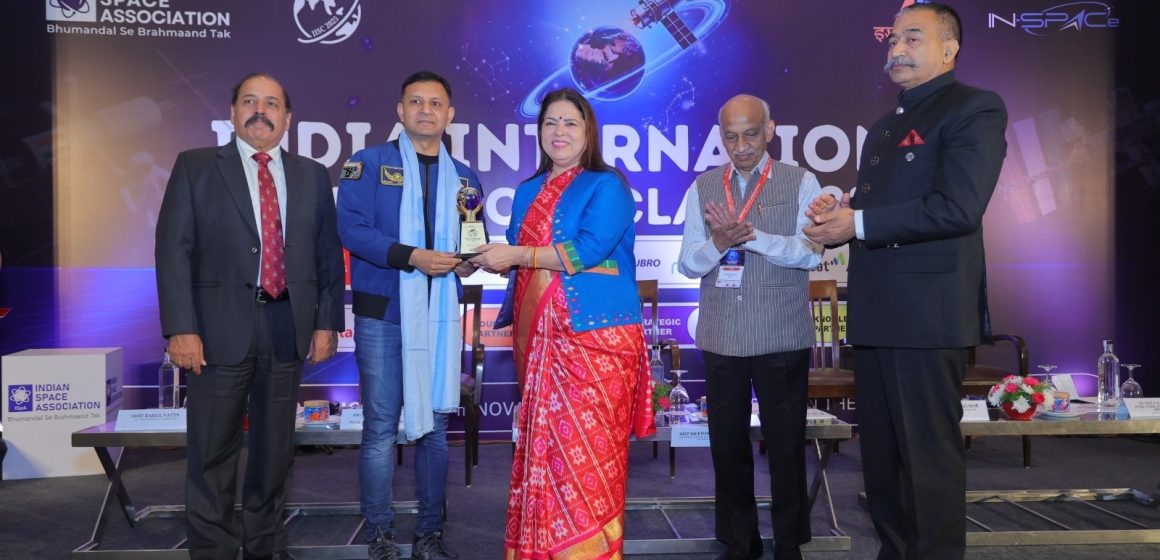Participants emphasised that India must ensure space is no longer dominated solely by the Global North, but instead compete and collaborate to make the sector more inclusive.
As India prepares to send its astronauts into space and expand its footprint in the global space economy, sector leaders at the India International Space Conclave (IISC) 2025 urged the country to take on a leadership role on behalf of the Global South. The two‑day forum, organised by the apex industry body, Indian Space Association (ISpA), highlighted collaboration, competence and inclusivity as the pillars of India’s future in space governance and exploration.
Setting the tone for the conclave, Chief Guest Meenakshi Lekhi, Former Minister of State for External Affairs & Culture, stressed the urgency of India’s role. “India represents the Global South and cannot allow outer space to be controlled only by the North. When India sits at the table, it speaks for the Global South.”
Echoing this call, Gp. Capt. PB Nair, Astronaut Designate, ISRO, argued that India’s presence in space is not just a national aspiration but a global necessity. “The world requires that an Indian go to space. This time, when new laws are written for space, India will be at the high table representing those who are not there.”
Adding to the vision, Gp. Capt. Angad Pratap, Astronaut Designate, ISRO, highlighted the broader opportunities beyond human spaceflight. “It is not just about sending humans to space but about research in microgravity and creating space tourism, which will bring revenue and opportunities.”
From a capability perspective, AS Kiran Kumar, Member, Space Commission and former ISRO Chairman, underlined the importance of competence. “You are recognised only when you build capability. India’s technological strength is why global agencies want to collaborate with us.”
Industry and defence voices also weighed in.
Air Chief Marshal RKS Bhadauria (Retd) noted the momentum building through startups and indigenous innovation. “India’s space ecosystem is gaining momentum as startups and industry bring fresh innovation and energy. Mastery of new-age technologies, whether in AI, quantum or cyber resilience, will determine our ability to lead.”
Summing up the breadth of discussions, Lt. Gen. A.K. Bhatt (Retd), Director General, ISpA, emphasised, “The discussion reflects the expanding depth of India’s engagement across multiple domains of space, from exploration to sustainability and in‑orbit technologies. International partnerships are strengthening India’s role in the space domain and positioning the country as a key driver of global collaboration.”
Building Robust Partnerships
The second day of the conclave also saw the European Space Agency (ESA) and ISpA sign a letter of intent to foster new collaboration, knowledge‑sharing and industry dialogue. The partnership will open avenues for joint research, commercial ventures and capability building, strengthening India’s position in the global space ecosystem.
The event featured a virtual address by Marjolijn Van Deelen, EU Special Envoy for Space, who said, “India matters profoundly to Europe’s security, prosperity and resilience. India and the EU have the same interest in ensuring that the space environment remains secure, safe, stable and sustainable.”
Panels on human spaceflight and lunar exploration by 2040 brought together ISRO astronaut designates, former JAXA astronaut Naoko Yamazaki, and experts from the Human Space Flight Centre and the Indian Air Force. Suhora Technologies showcased advances in multi‑sensor earth observation, underscoring India’s growing technological depth.
The conclave also released the report Enabling the New Space Economy: ISAM as a Pillar of Orbital Sustainability, prepared by ISpA and IIFCL Projects Ltd. It outlined how in‑space servicing, assembly and manufacturing (ISAM) can extend satellite lifespans, reduce debris and enable new business models, positioning India at the forefront of sustainable space practices.
With over 1,000 attendees, the event brought together astronaut designates, ISRO leaders, government officials and industry pioneers, united in their vision of India leading the Global South into a more inclusive and resilient space future.


